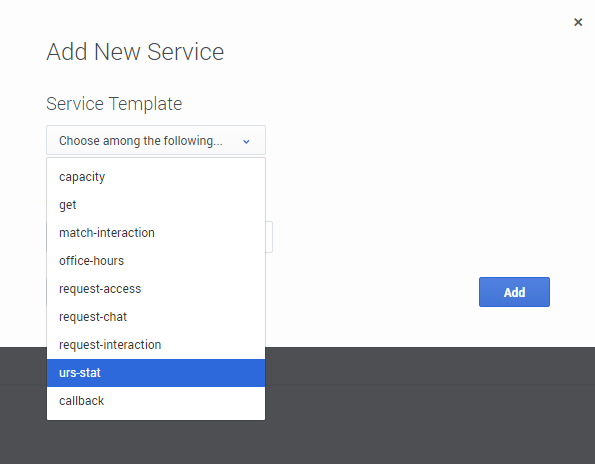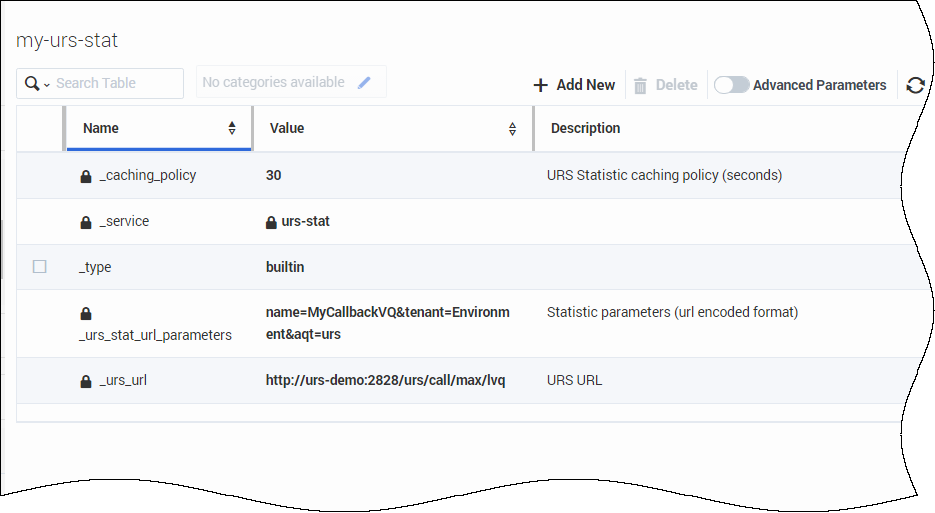_caching_policy
Section: urs-stat
Default Value: 5
Valid Values: Integer
Changes Take Effect: Immediately
This option is mandatory.
URS Statistic caching policy in seconds.
_urs_stat_url_parameters
Section: urs-stat
Default Value: No default value
Valid Values: String
Changes Take Effect: Immediately
This option is mandatory.
Additional URS lvq input parameters (url-encoded format). For example: name=<VQ_Name>&tenant=<Tenant_Name>&aqt=urs
_urs_url
Section: urs-stat
Default Value: No default value
Valid Values: URL
Changes Take Effect: Immediately
This option is mandatory.
The URS URL formatted as follows: http://<urshost>:<ursport>/urs/call/max/lvq. This option can also point to the load balancer in front of the URS.
Urs-stat
Type: builtin
Updated in: 8.5.109
Create a GMS built-in service using the urs-stat template that provides the following benefits:
- Statistics caching of the statistic to reduce load on URS. The _caching_policy parameter sets the cache period in seconds (see below).
- Load balancing and scaling across multiple GMS nodes.
- A single point of contact for your app.
Create a urs-stat Service
To create this GMS built-in service, select the urs-stat template when creating a new service.

Configure urs-stat parameters
Configure the following parameters in your <name-of-urs-stat-service> service:
| Option | Description |
|---|---|
| _urs_url | The URS URL formatted as follows: http://<urshost>:<ursport>/urs/call/max/lvq. This option can also point to the load balancer in front of the URS.
|
| _urs_stat_url_parameters | Additional URS lvq input parameters (url-encoded format). For example: name=<VQ_Name>&tenant=<Tenant_Name>&aqt=urs
|
| _caching_policy | URS Statistic caching policy in seconds.
|
For example:
_caching_policy=30 # Cache refresh time in seconds
_service=urs-stat
_type=builtin
_urs_stat_url_parameters=name=<VQ_Name>&tenant=<Tenant_Name>&aqt=urs
_urs_url=http://<urshost>:<ursport>/urs/call/max/lvqWhere: VQ_Name, Tenant_Name, urshost, and ursport match the environment and Callback service's Virtual Queue (VQ). The following screenshot shows the creation and configuration of the my-urs-stat service.
Query EWT Using the urs-stat Service
The following query example shows the resulting response that you get when you call the service:
GET http://<gmshost>:<gmsport>/genesys/1/service/<name-of-urs-stat-service>
Response:
{ "wcalls" : 20, "wpos" : 21, "time" : 1467922222, "hit" : 95, "calls" : 20,
"wt" : 0, "ewt" : 300, "pos" : 21, "aqt" : 300 }- The value of interest here is ewt: the time unit is seconds and can be a float value.
- An empty object will be returned if there is no activity for the VQ.
You can use a single service for multiple VQs by omitting the _urs_stat_url_parameters option from the service and including the value for that option (for example, name of virtual queue, tenant ID, or statistical method) in the HTTP request as follows:
http://<gmshost>:<gmsport>/genesys/1/service/<name-of-urs-stat-service>
?name=<one-of-the-callback-VQs>&tenant=<tenant-name>&aqt=ursThe URS stat service will append the content of the _urs_stat_url_parameters option and the HTTP request parameters to the URS query. To view additional URS lvq input parameters and output information, open a browser with URS running and run the help method for lvq as follows:
http://<urshost>:<ursport>/urs/help/call/lvqThe help method is described in the Universal Routing 8.1 Reference Manual, Appendix C, "Supported Methods."
If, for example, you set the following configuration for the <name-of-urs-stat-service> service:
_caching_policy=5
_service=urs-stat
_type=builtin
_urs_stat_url_parameters=scale=true&tenant=Environment&aqt=urs
_urs_url=http://<ursloadbalancer>:<ursport>/urs/call/max/lvqYou can can use this service for multiple VQs by specifying only the name of a virtual queue in the HTTP request as follows:
http://<gmshost>:<gmsport>/genesys/1/service/<name-of-urs-stat-service>
?name=<one-of-the-callback-VQs>
